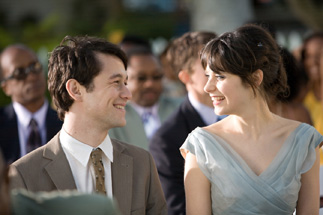Movie Review: (500) Days of Summer
By Matthew Huntley
August 4, 2009
BoxOfficeProphets.com

The story is quite simple: Tom (Joseph Gordon-Levitt) is a greeting card writer in Los Angeles who falls for the office secretary, Summer (Zooey Deschanel). As soon as Summer tells Tom she loves The Smiths, it's more or less love at first sight. Perhaps it's her high-pitched, wandering voice or her sparkling eyes, but Tom is immediately smitten and feels a deep connection with this girl. Gradually and naturally, the two gravitate toward each other. They kiss in the copy room and pretend they're a married couple in Ikea. But, and this is important, she tells him she's not looking for anything serious. In fact, their first deep conversation is about whether love exists. He says it does; she says it doesn't.
Who eventually finds love in the film, I will not say, because that's irrelevant in this story. (500) Days of Summer isn't about the lasting effects other people have on our lives (like so many love stories); it's more about the present effects they have on us. To me, the film celebrates life's moments as they happen. Whereas so many of us live according to what's going to happen next, this film basks in what's happening now. Conflict arises between Tom and Summer because he doesn't see this as clearly as she does. He's more traditional and wants something he knows will be long-lasting. Summer is more of a free spirit, willing to just live in the moment.
There are many wonderful scenes in the film, the best being a sequence when Tom and Summer, after they've already broken up (don't worry, this is revealed at the beginning), reunite at a wedding. Under normal Hollywood circumstances, the characters in this situation would either: a) pretend they didn't know each other; b) start to fight; or c) fall back into each other's arms, and possibly have loud, passionate sex. But this film makes it a point to defy convention, and Tom and Summer wind up talking like old friends and simply enjoy each other's company. It's a beautiful, magical moment that reminds them why they were attracted to each other in first place.
Another great scene is actually a dance number, which is funny and spontaneous, but not performed too professionally, which makes it all the more charming. There's also an inspired sequence when the film utilizes a split screen to show Tom's expectations juxtaposed with his reality. Amazingly, the expectations are not made too far-fetched and sometimes even match the reality (another sign the film is more interested in truth rather than fantasy). Given the genre, these moments would normally come off as gimmicks, but they're meant to develop the characters and relay their points of view, and they triumph.
Gordon-Levitt and Deschanel are perfectly cast as the two young adults trying to figure out what they want in life. Tom is a greeting card writer only as a means to survive; he's actually an architect with an eye for beauty. The only thing he needed was a wake-up call.
For some time now, Gordon-Levitt has proven himself an important actor (see The Lookout). He has a gift for playing characters stricken with anguish and uncertainty. Even though his looks make it easy for him, he's able to embody characters who look like they're suffering instead of just looking like them, and we empathize and care for him. And Deschanel, who seems airy with her calm voice and owl-eyed expressions, balances her performance so we believe Summer is both a pragmatist and a woman who goes against traditional ideals.
When you listen to the two actors talk, you think you're listening to real people. The screenplay by Scott Neustadter and Michael H. Weber contains dialogue so well written and truthful, it's almost eerie. Consider the scenes when Tom and Summer talk about their past lovers or look at art in a museum, or the powerful scene at the end that feels right out of a real-life situation, which director Marc Webb lends the perfect amount of pathos.
I have no doubt (500) Days of Summer will thrive in limited release and gradually take off thanks to word-of-mouth. It puzzles me why movies like The Ugly Truth are released at saturation level but something as magical as (500) Days has to start off in fewer markets. Hollywood too often underestimates audiences and thinks we only want more of the same everywhere we go, but it's films like (500) Days, so different and original, that we remember most. Funny, how a film that reminds us to live in the now will resonate with us for years to come.